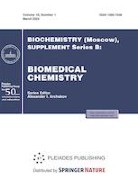
The article "Antifungal Macrocycle Antibiotic Amphotericin B - Its Present and Future. Multidisciplinary Perspective for the Use in the Medical Practice" by Arifa Bagirova, leading researcher of the Department of Experimental Botany of ANAS Botany Institute, was published in Biochemistry (Moscow) supplement series III: Biomedical Chemistry magazine.
The article presents an extensive analysis of the research results of the macrocyclic polyene antibiotic amphotericin B on cell membranes. Numerous studies show that this antibiotic is very effective not only against fungi, but also against viruses, bacteria and tumors. In the conditions of a global pandemic, fungal pathology is actively developing. Lung diseases and especially invasive aspergillosis appear during coronavirus infection. Its treatment involves amphotericin B and new liposomal forms of this drug. The article provides information on the biological activity of amphotericin B, its action on membranes, and the mechanism of its action on fungi, viruses and bacteria. Chemical and genetic engineering transformation of the molecule opens new perspectives for antibiotics. The article shows that new generation drugs can be used more effectively in the treatment of pathogenic infections.